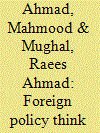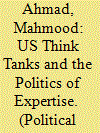|
|
|
Sort Order |
|
|
|
Items / Page
|
|
|
|
|
|
|
| Srl | Item |
| 1 |
ID:
107984


|
|
|
|
|
| Publication |
2011.
|
| Summary/Abstract |
In foreign policy realm, Chinese think tanks are day by day getting more influential, complex, and numerous. This article is an effort to trace the nature, scope, typology, and influence of policy advice institutions in China against the time blocks of past, present, and future. After defining the factors working behind the present growth of think tanks in China, the present era is also substantiated for all non-Chinese actors as the unprecedented time of access and interaction since 1949.
|
|
|
|
|
|
|
|
|
|
|
|
|
|
|
|
| 2 |
ID:
135175


|
|
|
|
|
| Summary/Abstract |
The drone is the latest tool to promote interests of a nation-state. It is clear that USA as well as other major powers anticipate that robotics will play a key role in future warfare. Today, more than 70 countries have already acquired drone technology and many others are desperate to join the ranks. This urge for drone technology will ultimately lead to a “boundless and borderless war without end.” In the case of Pakistan, the US drone campaign has raised some important issues regarding how their use could, or should, be regulated in the future. This article analyses the legal issues raised by the US's use of drone technology in non-combat zones, such as Pakistan. It is argued that a reckless disrespect of Pakistan's sovereignty has had adverse implications and consequences for the legitimacy of the Pakistani government. Drone strikes have prompted instinctive opposition among the Pakistani population, hurt their feelings and estranged them from the government. This in turn has added to Pakistan's instability and stimulated a ground-swell of animosity toward the USA.
|
|
|
|
|
|
|
|
|
|
|
|
|
|
|
|
| 3 |
ID:
129482


|
|
|
|
|
| Publication |
2014.
|
| Summary/Abstract |
Today, more than 70 countries possess drone technology and many others are seeking to acquire it. This outburst in drone technology compels the nations to involve in a new arms race and promises to change the conduct of war as they counterbalance their adversaries. The development of technological improvements will eventually usher in a "boundless & borderless war without end," such as the case of the U.S. drone program in Pakistan. It raises some important issues regarding how drone use should be governed in the future. This paper primarily focuses on the political and strategic costs of drone campaigns in Pakistan. It is argued that drone strikes undermine the legitimacy of local governments, crumble its stability, intensify anti-American sentiment, and breed terrorism by creating new recruits for militants who aim to overthrow their governments and who, by the same token, portray these governments as helpless and subservient to the United States' unchecked power that consequently weaken the credibility of these government to win the loyalties of their own population.
|
|
|
|
|
|
|
|
|
|
|
|
|
|
|
|
| 4 |
ID:
084374


|
|
|
| 5 |
ID:
130952


|
|
|
|
|
| Publication |
2014.
|
| Summary/Abstract |
It is clear the United States and other major powers see drone warfare as the wave of the future. Today more than 70 countries possess drone technology and many others are seeking to acquire it. It is expected that within 20 years, there will be swarms of drones and many autonomous fighters and bombers in use around the globe. If the trends continue as anticipated, these drones will usher in a 'boundless and borderless war without end'. The development of technological improvements will eventually lead to a militarisation of foreign policy and unnecessary conflicts. While the circumstances in Pakistan are unique, the questions surrounding the US drone programme in non-combat zones such as Pakistan raise important issues regarding how drone use should be governed in the future. This article is an attempt to analyse legal and ethical issues raised by the US use of drone technology in non-combat zones such as Pakistan, and it looks into its underpinnings and also its repercussions as tool in prospective warfare.
|
|
|
|
|
|
|
|
|
|
|
|
|
|
|
|
|
|
|
|
|